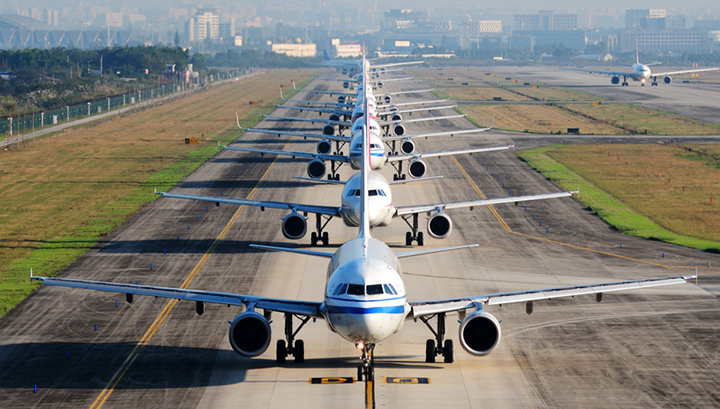The Federal Aviation Administration (FAA) is investigating how two commercial planes nearly collided on the runway. The incident happened at John F. Kennedy International (JFK) Airport on Jan. 13, around 8:45 p.m.
A Delta Air Lines pilot operating a Boeing 737 stopped takeoff when air traffic controllers noticed an American Airlines plane in the crossway.
It was a good eye and quick thinking from air traffic controllers that ultimately prevented a catastrophe. Delta’s pilot reportedly stopped the plane approximately 1,000 feet from where the American Airlines Boeing 777 had crossed, CNBC reports.
Audio posted by Twitter user xJonNYC of the incident details a scary situation.
“Delta 1943 cancel takeoff plans! Delta 1943 cancel takeoff plans!” a presumed air traffic controller yells.
“Rejecting,” someone responds.
It’s unclear who the next voice is, but someone on the audio clip lets out a big sigh of “whew,” indicating a very close call.
The National Safety Transportation (NTSB) is also investigating the incident.
Two audio excerpts from @liveatc pic.twitter.com/4ruAWgVO4b
— 🇺🇦 JonNYC 🇺🇦 (@xJonNYC) January 14, 2023
NTSB is investigating the Jan. 13 runway incursion at JFK airport involving an American Airlines Boeing 777 and a Delta Boeing 737.
— NTSB Newsroom (@NTSB_Newsroom) January 15, 2023
What We Know About The Flights
Delta Air Lines Flight 1943 was heading to the Dominican Republic when the two planes nearly collided. Unfortunately, the plane returned to the gate, and onboard passengers had to deplane. The flight was delayed overnight and departed the following day.
“The safety of our customers and crew is always Delta’s number one priority,” the representative said in a statement. “Delta will work with and assist aviation authorities on a full review of flight 1943 on Jan. 13 regarding a successful aborted takeoff procedure at New York-JFK. We apologize to our customers for the inconvenience and delay of their travels.”
American Airlines remains tightlipped on the incident, but CEO Rob Isom says the FAA needs more resources and a big investment in its technology.
“It’s going to be billions of dollars and it’s not something that’s done overnight,” he tells CNBC. “It’s something that we have to plan for and build over a number of years.”
Delta Airlines CEO, Ed Bastian, feels the same.
“I lay this on the fact that we are not giving them [the FAA] the resources, the funding, the staffing, the tools, the technology they need,” he adds. “Hopefully, this will be the call to our political leaders in Washington that we need to do better.”
A Rough Start Into 2023
While it remains unclear how the two planes nearly collided on the JFK runway, it’s safe to say the aviation industry is having a rough start to the New Year. Unfortunately, passengers are caught in the crossfire of the industry’s failures.
Southwest Airlines is now trying to right a wrong following its meltdown at the end of 2022 into the beginning of 2023. A historic winter storm and the company’s outdated technology for staff scheduling left thousands of passengers stranded in what will surely be a sore spot for years to come.
The airline reportedly canceled more than 15,500 flights between mid-December and the beginning of January.
“Emerging from some of the most challenging days in our Company’s history, we are highly focused on our Customers, our recovery, and our plan going forward,” Southwest CEO Bob Jordan said in a statement. “Our immediate task has been to stabilize our operation.”
‘Southwest Should Pay:’ Social Media Users Say Southwest Owes Bride Who Missed Wedding In Belize
Almost immediately after Southwest got on track, the FAA experienced a technology outage that caused delays and cancellations nationwide on Jan. 11.
FlightAware data revealed close to 10,000 flights to, from, and within the United States and more than 1,300 cancellations into the evening.
A computer failure at the agency impacted departing flights. Pilots and air traffic controllers use the affected system, known as Notice To Air Missions (NOTAM), to obtain flight hazard information and real-time restrictions.
“Our preliminary work has traced the outage to a damaged database file,” an FAA spokesperson tells CNN. “At this time, there is no evidence of a cyberattack.”





